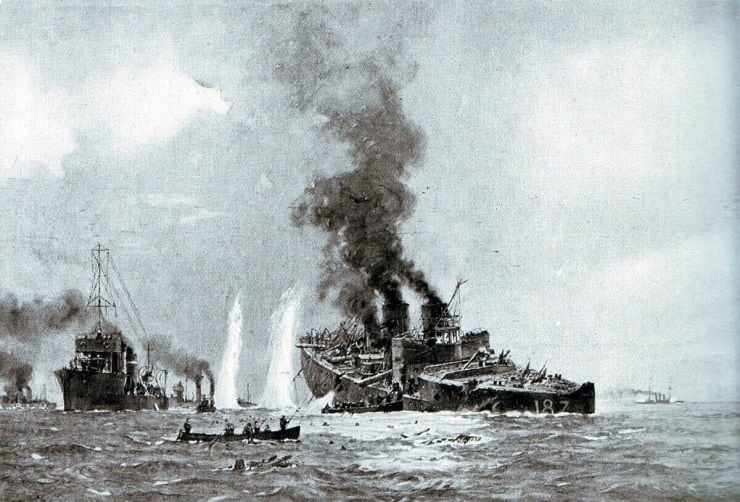28.8. 1914 First Battle of Helgoland Bay
Categories: First World War , Calendar

The Battle of Helgoland Bay was part of the First World War. The Royal Navy attacked on 28 August 1914. Precise British fire soon sent two German ships to the bottom before reinforcements arrived.Thefighting ended in a British victory.
Some Royal Navy officers resented the inaction imposed on them by Jellicoe's decision to follow a defensive strategy. One of these officers, Commodore Reginald Tyrwright, commander of the cruisers anchored at Harwich, drew up a plan for one offensive action. He noted that the German destroyers patrolling Helgoland Bay near Wilhelmshaven followed a regular schedule in their patrols.
He suggested that the Royal Navy take advantage of this fact and attack one of the smaller patrol fleets. A hesitant Jellicoe agreed to this, and even reinforced the attack with Beatty's fleet of cruisers. "The Royal Navy attacked on 28 August 1914. Accurate British fire soon sent two German ships to the bottom before the German reinforcements arrived. By the afternoon, however, the scales began to tip on the German side and Tyrwright had to withdraw, but the clash sentthe mighty forces of Beatty," writes Andy Wiest in A Pictorial History of the First World War.
As more and more ships arrived on the battlefield and the battle became completely opaque, the British ships found themselves dangerously close to each other and almost fired on each other in the heat of battle. The Battle of Helgoland Bay ended in a British victory that cost the Germans three cruisers, one destroyer and a total of 1,200 men. The British force lost "only" 35 men.
The Germans, too, had several naval officers dissatisfied with their own inaction, demanded a bolder strategy. Admiral Franz von Hipper, commander of the German cruiser fleet, wanted to engage the Royal Navy in open battles and slowly strip them of their naval superiority.
His plan was to attack British coastal towns, then he hoped Jellicoe would respond by sending isolated fleets to deal with the danger. The fleets would be so weak that the Germans would destroy them just fine. "In November and December, the Germans attacked the British coast, killing hundreds of British civilians, al failed to lure the ships of the British Great Humanity into a trap," Wiest further states.
A completely different chapter was the German attack that took place on January 25, 1915. The Battle of Dogger Bank began. "In January, during a battle near Dogger Bank in the North Sea, where British warships clashed with German ones, a total of 782 sailors died on the sunken armoured ship Blücher. When a German torpedo tore apart the British steamer Falaba," writes Martin Gillbert in his book Twentieth Century History. The British were victorious in this battle.
Sources:
Andy Wiest, Pictorial History of the First World War
Martin Gillbert, History of the Twentieth Century
www.britishbattles.com
The article is included in categories: